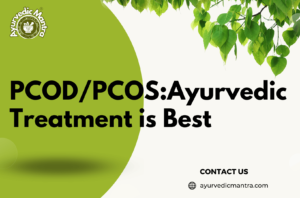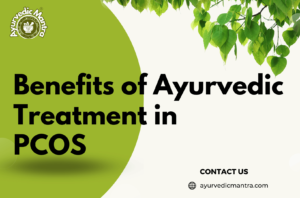
PCOD/PCOS: Ayurvedic Treatment is Best
Introduction Polycystic Ovary Disorder (PCOD) or Polycystic Ovary Syndrome (PCOS) is a common endocrine disorder affecting millions of women worldwide. It leads to hormonal imbalances,


Polycystic Ovary Syndrome (PCOS), often called Polycystic Ovary Disorder (PCOD), is a common hormonal disorder affecting women of reproductive age. Despite its prevalence, there is a considerable amount of misinformation surrounding PCOD. This article aims to debunk myths and present accurate information to foster a clearer understanding of this complex condition.
Fact: While the name might suggest a primary focus on ovarian cysts, PCOD involves a broader range of hormonal imbalances. It is characterized by elevated levels of androgens (male hormones) and insulin resistance, leading to various symptoms, including irregular periods, excessive hair growth, acne, weight gain, and fertility issues. The term “polycystic” refers to the small, undeveloped follicles on the ovaries, which are often mistaken for cysts.
Fact: While weight gain and difficulties in weight management are typical in PCOD, not all women with the condition are overweight. Lean women can also be diagnosed with PCOD. Weight gain is often linked to insulin resistance and hormonal imbalances in PCOD, but it is not a universal rule.
Fact: PCOD extends beyond reproductive health. It is associated with a range of metabolic and cardiovascular risks. Women with PCOD are more likely to develop type 2 diabetes, cardiovascular disease, and endometrial cancer due to insulin resistance and hormonal imbalances. Managing PCOD involves addressing these broader health concerns.
Fact: While PCOD can affect fertility by disrupting ovulation, it doesn’t mean women with PCOD cannot conceive. Many women with PCOD have successfully created medical interventions, lifestyle changes, and fertility treatments. Early diagnosis and proper management can significantly improve the chances of conception.
Fact: Hormonal birth control pills are commonly prescribed to regulate menstrual cycles and manage symptoms of PCOD. However, they are not the only treatment option. Lifestyle changes such as a balanced diet, regular exercise, and weight management play a crucial role. Other medications, such as anti-androgens and ovulation-inducing drugs, may also be used based on individual needs.
Fact: While lifestyle factors can exacerbate PCOD symptoms, they are not the sole cause. Genetic predisposition and environmental factors also contribute. Insulin resistance is a critical player in PCOD development, and while maintaining a healthy lifestyle can help manage symptoms, it may not prevent the condition entirely.
Fact: Acne and hirsutism (excessive hair growth) in PCOD are not merely cosmetic concerns. They are manifestations of hormonal imbalances and can have significant psychological and emotional effects on those affected. Addressing these symptoms is essential for overall well-being.
Fact: PCOD cannot be cured entirely, but its symptoms can be managed effectively through medical interventions and lifestyle changes. Many women with PCOD can lead healthy and fulfilling lives with proper care. Regular monitoring and proactive management are vital in controlling the condition.
Fact: While some herbal supplements may provide certain benefits and symptom relief, they are not a substitute for evidence-based medical treatment. PCOD is a complex hormonal disorder that requires a comprehensive approach, which may include medications, dietary adjustments, and other medical interventions.
Fact: PCOD symptoms vary widely among individuals. Some women may experience milder symptoms, while others may have more severe manifestations. Early diagnosis, appropriate treatment, and lifestyle changes can help manage and alleviate symptoms, regardless of intensity.
In conclusion, separating facts from myths about PCOD is crucial for a better understanding this multifaceted condition. PCOD is not solely about ovarian cysts or fertility concerns; it involves complex hormonal imbalances that affect various aspects of a woman’s health. By dispelling these misconceptions and embracing accurate information, individuals with PCOD, healthcare providers, and the broader community can work together to promote better awareness, support, and effective management strategies. If you suspect you have PCOD or are experiencing related symptoms, consult a healthcare professional for accurate diagnosis and personalized guidance.

Introduction Polycystic Ovary Disorder (PCOD) or Polycystic Ovary Syndrome (PCOS) is a common endocrine disorder affecting millions of women worldwide. It leads to hormonal imbalances,

Introduction Losing weight is a journey that requires dedication, consistency, and self-care. While there are numerous weight loss techniques out there, not all of them

Polycystic Ovary Syndrome (PCOS) is a hormonal disorder that affects millions of women worldwide. It can lead to various health complications, such as irregular periods,

In recent years, Ayurveda, an ancient system of natural healing originating from India, has gained significant popularity as an alternative approach to treating various health

आजकल वजन बढ़ने और चर्बी की वृद्धि होने की समस्या एक आम समस्या बन गई है। बढ़ते वजन और अतिरिक्त चर्बी के कारण न केवल

प्रस्तावना: आजकल वजन बढ़ने और ओबेसिटी की समस्या एक आम समस्या बन गई है। बढ़ते वजन के कारण न केवल शारीरिक समस्याएं होती हैं, बल्कि
